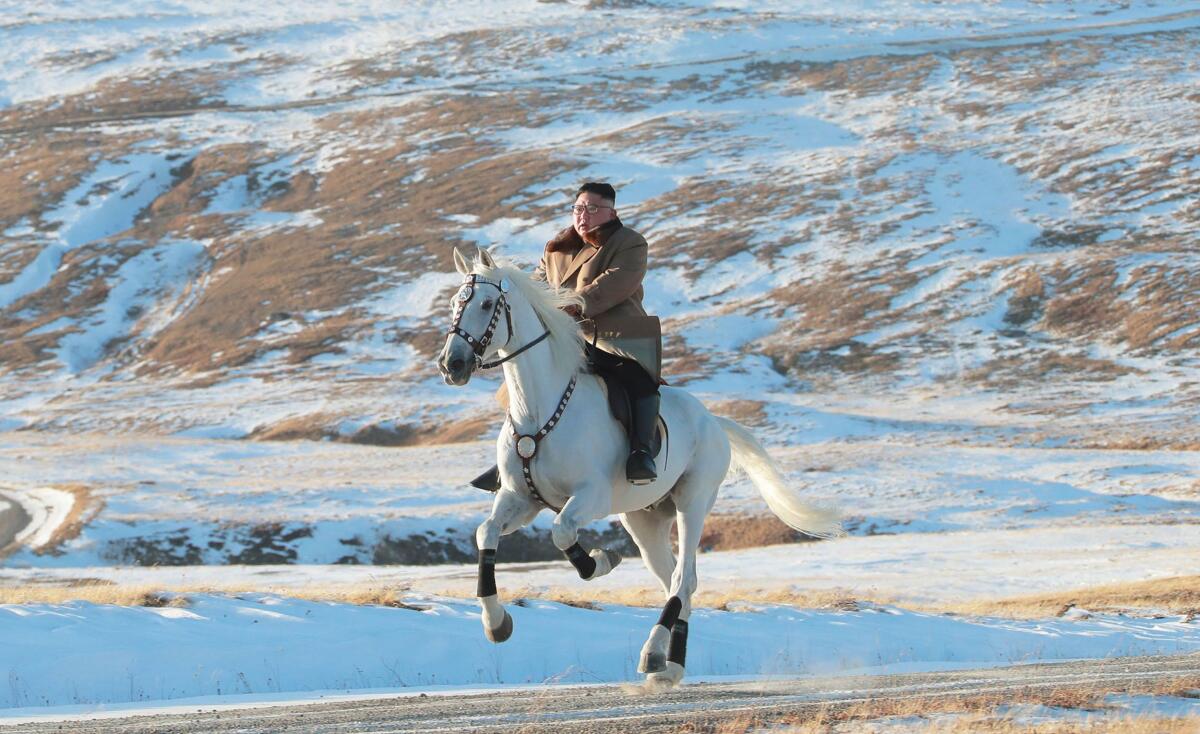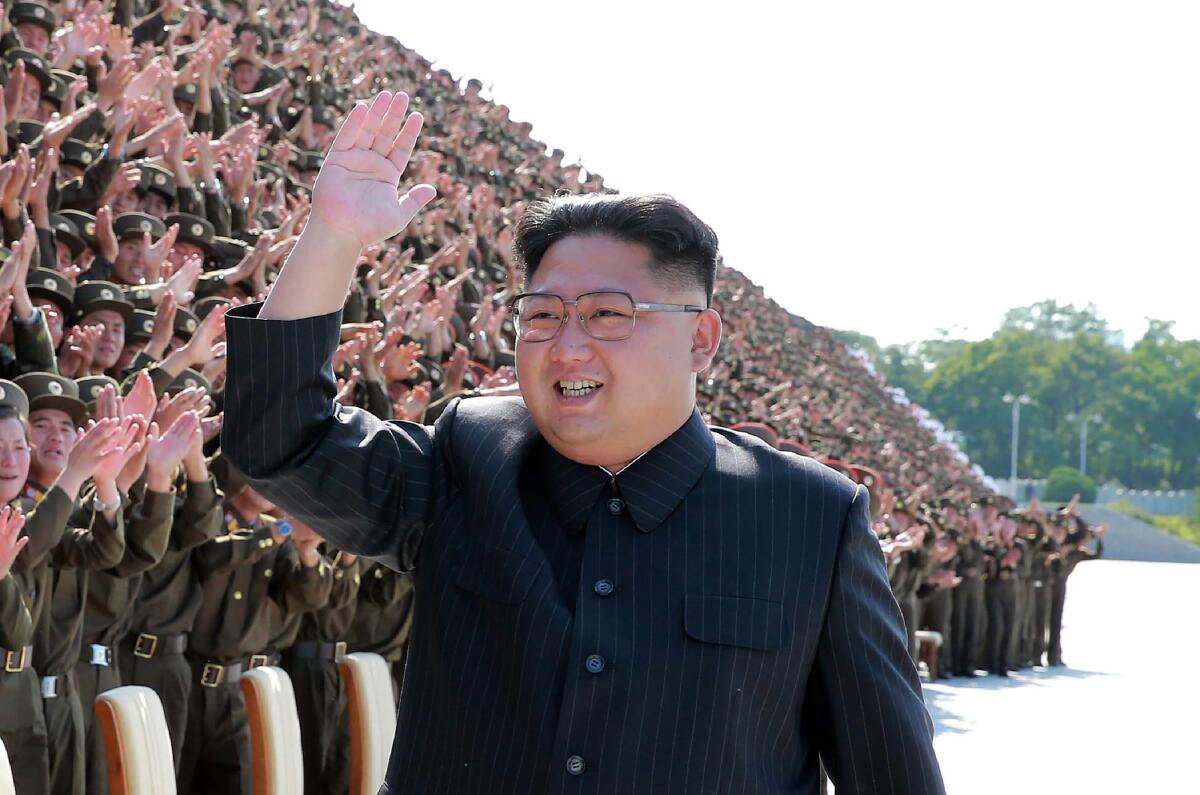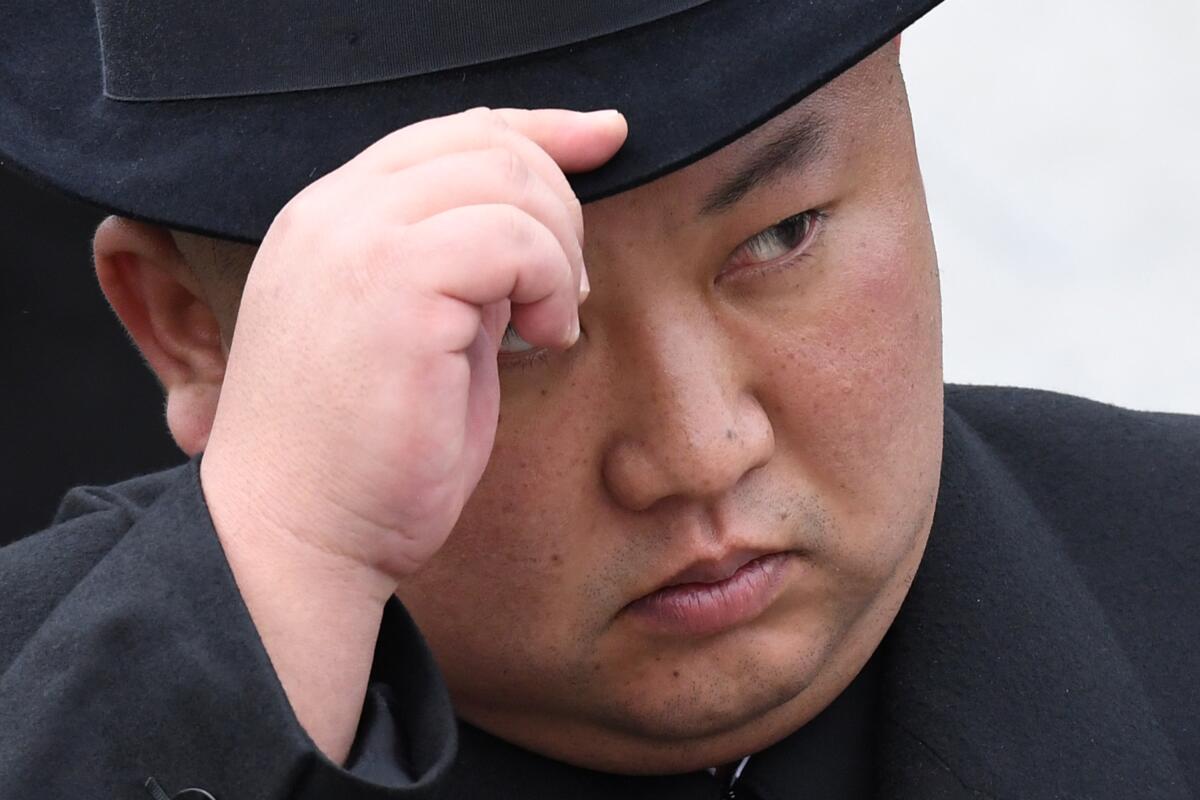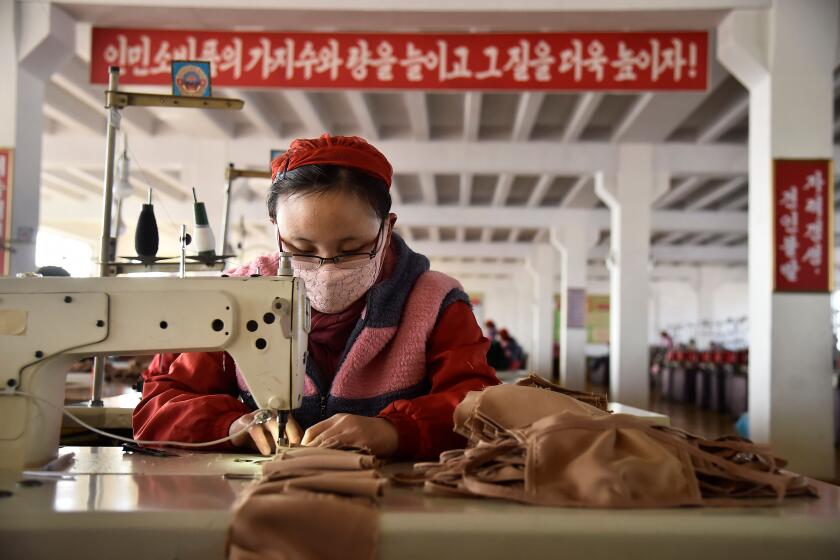Rumors over Kim Jong Un’s health make one thing clear: North Korea’s cult of personality endures

- Share via
SEOUL — When North Korea’s Kim Jong Un appeared in state media late last year galloping across a snow-covered Mt. Paektu atop a white steed, the over-the-top image drew much ridicule and parody from bemused outsiders.
But to North Koreans steeped in state propaganda from a young age and observers tracking the country’s leadership, the image was an unmistakable allusion to the mythology surrounding Kim and the bloodline from which he descends, central to the agitprop legitimizing Kim’s third-generation rule.
After all, Mt. Paektu is considered a sacred revolutionary site in the isolated nation, the place where the country’s founder and Kim’s grandfather, Kim Il Sung, is said to have battled Japanese colonial forces on horseback, and where Kim’s father, Kim Jong Il, was purportedly born.
Experts are skeptical of the no-coronavirus claim from the tightly controlled country so desperate to maintain the status of its border with China.
Even as the ranks of autocrats who commanded their populations through cults of personality have thinned over the decades — Iraq’s Saddam Hussein, Libya’s Moammar Kadafi, Venezuela’s Hugo Chavez disappearing into history one after the other — North Korea’s Kim dynasty has endured, outlasting the end of the Cold War, the dawn of the smartphone-enabled information age and the death of the first Kim, then the second.
Kim has perplexed U.S. presidents, amused and frightened diplomats, entertained former NBA star Dennis Rodman and inspired “Saturday Night Live” jokes and Hollywood caricatures. “The Interview,” a film starring Seth Rogen, which satirizes a fictional account of Kim’s assassination, so infuriated the leader that his government reportedly ordered a cyberattack against Sony Pictures Entertainment in 2014.
The recent international flap over the Kim‘s health — as-yet-unconfirmed reports ranging from him convalescing after a medical procedure to being gravely ill to having fallen into a vegetative state — unleashed panicked speculation over what would happen in the event of his death or incapacitation, showing how the fate of the country is still seen as inextricably linked to that of one much-hyped individual.

“North Korea, more so than any other country, is defined as one person, when there are 25 million other people,” said Sokeel Park, director of research and strategy for the group Liberty in North Korea, which helps refugees fleeing the repressive country.
“That system is so based around having one Kim leader,” he said. “It looks like it would be very hard for someone not a Kim to be the top figure and to hold it together.”
Rumors about Kim’s health intensified after his absence on April 15, his grandfather’s birthday and North Korea’s most important holiday, celebrated as the “Day of the Sun.” In past years, Kim was always seen paying his respects at the mausoleum where the embalmed bodies of his father and grandfather are enshrined in glass — this year, state media showed only a flower basket with a ribbon bearing his name.
The dictator — with his nuclear ambitions and bulletproof train — again loomed large in the world’s imagination. Despite South Korean authorities repeatedly playing down reports of Kim’s illness, his prolonged absence — he was last seen April 11 — has fueled a host of theories about his well-being. Information about Kim’s health is a secret that only a handful of people inside the country would be privy to, calling into question the veracity of various reports.
“How can anybody say? I don’t even think high-level intelligence officials in the U.S. or South Korea would know,” said Rachel Minyoung Lee, a former longtime North Korea media analyst for the U.S. government.

Months before Kim held formal government titles, state propagandists got to work exalting him. A triumphant song glorifying Kim, “Footsteps,” was widely taught to the North Korean people beginning in early 2009. Legendary stories about his language proficiency, marksmanship and driving prowess from a young age added to the myth. His striking physical resemblance to his grandfather, channeling his clothing, gait and corpulence, secured his place as the latest iteration of the country’s preordained leadership.
Kim the Third, who was not yet 30 when he took power after his father’s death in 2011, exceeded the world’s expectations by managing to exude the god-like aura that had surrounded his father and grandfather, even as international sanctions choked the country’s economy and information about the outside world increasingly penetrated its northern border with China.
He matured into a riddle who could unnerve the planet with defiant missives and underground explosions. If any among the North Korean elite harbored doubts about Kim‘s leadership, they quickly learned to keep silent. Kim set about brutally eliminating threats to his power, executing his own uncle and having his half brother killed by a nerve agent. Average North Koreans caught escaping the country were also subject to harsher crackdowns after his takeover.
“North Korea, more so than any other country, is defined as one person, when there are 25 million other people.”
— Sokeel Park, Liberty in North Korea
Far more comfortable in the public eye than his diminutive, reserved father, Kim appeared to win favor among North Koreans by putting an emphasis on modernizing the country’s impoverished economy, building snazzy high-rise apartments and resorts, and in effect condoning a network of unofficial markets that gave rise to a newly moneyed middle class.
Above all, Kim stunned domestic and international audiences in 2018 when he secured something his grandfather and father never did: a summit with a sitting U.S. president. Appearing alongside an attention-grabbing American president more than twice his age, Kim seemed to hold his own.
He basked in the international limelight shaking the hand of President Trump, who months earlier had mocked him as “Rocket Man,” alluding to his many missile tests. But Trump quickly pivoted, praising Kim’s smarts in hopes of securing a deal that had eluded his predecessors. Kim sauntered about tourist sites in Singapore, waving to fascinated crowds yelling his name.
“Kim Jong Un is really the one who’s controlling the pace and scope of what’s happening diplomatically,” arms control and foreign affairs scholar Gary Samore said in a panel at the Council on Foreign Relations following the summit. “Kim Jong Un has really just been masterful.”
Even South Koreans, technically still at war with their northern neighbors and whose imminent destruction is at Kim’s fingertips, seemed charmed with his debut on the world stage. After Kim’s first meeting with South Korean President Moon Jae-in, more than three-quarters of those polled in one survey said they found Kim trustworthy.
The high-stakes statecraft also boosted Kim domestically.
“You saw a lot of movement on the part of the state propaganda apparatus after [the 2019 summit with Trump in] Hanoi to further cement his leadership. The level of propaganda went up noticeably,” said Lee, the media analyst. “It was about North Korea being at the same level as the world’s great powers, how Kim Jong Un raised North Korea’s dignity.”
With no independent media to speak of or any freedom of expression, it’s difficult to know to what extent the present-day North Korean public buys the unalloyed rhetoric about Kim. Despite crackdowns, South Korean and Chinese movies and television shows are widely available on smuggled thumb drives, offering glimpses of the world beyond. In one 2016 report by the U.S. think tank Center for Strategic and International Studies that surveyed 36 North Koreans still living in the country, all but one said their friends, family or neighbors would complain or crack jokes about the government in private.
“It’s not black and white, like people assume from the outside. You can support some policies and be frustrated with other policies,” said Park of Liberty in North Korea. “The cult of personality still holds for some people.”
Lim Jae-cheon, a professor at South Korea’s Korea University and a scholar on North Korean leadership, said that even if the strength of the cult of personality had been weakened by outside information in recent years, Kim’s death or serious illness would nonetheless be earth-shattering for most North Koreans.
“The idolization is institutionalized and internalized within the people’s psyche, and becomes accepted as natural,” he said. “That social control has been rigorously maintained.”
More to Read
Sign up for Essential California
The most important California stories and recommendations in your inbox every morning.
You may occasionally receive promotional content from the Los Angeles Times.












